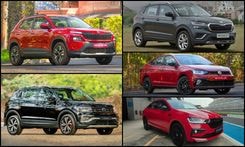Government Stands By Decision to Implement BS-VI Norms by 2020
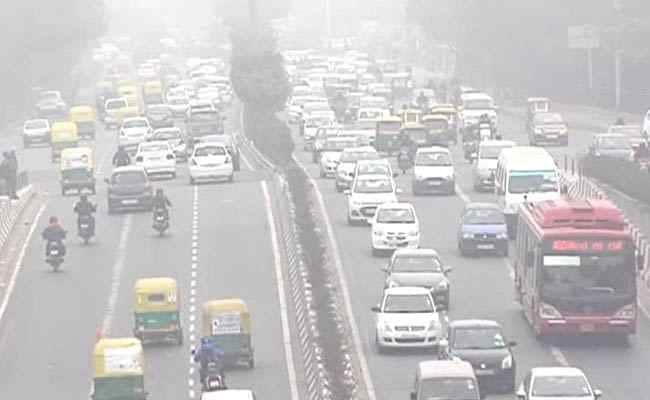
The government has decided to stand by its decision of pushing forwards the date of implementation of Bharat Stage VI (BS-VI) emission norms to 2020 despite the concerns portrayed by the automotive industry.
Yesterday saw the heads of 26 auto companies meet with the Road Transport and Highways Minister, Nitin Gadkari, to thrash out the details of how this huge jump in emissions norms would have to be made. According to the industry heads, the norms would first have to be enforced on new models that are to be launched by 2020 and existing models would be required to follow suit, immediately after.
Also Read: Maruti Suzuki Sceptical About Indian Government's BS-VI Fuel Plans
Speaking on this matter, the President of the Society of Indian Automobile Manufacturers and MD of Ashok Leyland, Vinod Dasari commented on how this proposed shift, if successfully implemented, would be the first of its kind that the world would ever have seen. The shift from BS-IV to BS-V itself takes 5 years whereas the subsequent shift to BS-VI takes another 6 years. This means that by skipping BS-V and going straight to BS-VI by 2020, India will not only be the first country to skip an entire stage, but will also have introduced technology that requires 11 years to evolve, in just 4 years.
Dasari said, "If there is a regulation, that comes tomorrow and says, we need to do it, the industry will try its best to do it. Whether we will be successful or not, we can't say today. Let me also say- European and American technologies simply cannot be applied in India. It's not that simple. Indian driving conditions are different."
Also Read: SIAM Says Implementing BS VI Emission Norms in India by 2021 is Unrealistic
Live Mint reports that the main reason that the minister gave behind bringing such hardship to the industry was that last year, India exported 2.5 lakh cars of which 1 lakh units complied with BS-VI norms. Gadkari asked, "If they can export such cars, why can't they make for India?"
However, despite the steep ask, the auto industry has stated that it will do its utmost to successfully bring the technology to India by 2020 but only if the government gave them some guarantees and fulfilled a few critical conditions. To create better demand for BS-VI, the government has been asked to scrap BS-I, II, and III cars. More importantly, the government has also been asked to give assurances that BS-VI type fuel would be available in all parts of the country by 2020 as opposed to a staggered approach as has been the case with BS-IV. Engines that operate on BS-VI type fuel, cannot run on any other fuel and hence this assurance it vital for the the technology to survive in India. Currently, not all parts of India have BS-IV as standard with the entire country set to be covered only by April, 2017.
Also Read: Skipping BS-V Fuel Norms Poses Safety Risks: SIAM
Pawan Goenka, Executive Director of M&M stated, "My guess is investments required will be Rs.50-Rs.100 crore for each model to upgrade to BS- VI norms." The change to BS-VI is reported to cost the entire industry and its supporting industries, anywhere between Rs 70,000 crore - Rs 90,000 crore.
Besides the hardships that will have to be endured by the industry during the graduation to BS-VI, the Supreme Court also banned the sale of diesel cars with engines above 2,000cc in the National Capital. Mahindra, Tata, Mercedes-Benz and Toyota were the worst hit by this ruling and even appealed to the apex court but to no effect. Although the auto industry has argues that less than 20 per cent of the pollution is caused by cars, Gadkari has stuck by his decisions stating that there is huge public pressure to improve air quality and that pollution needs to be cut down, no matter how big or small the source. "Neither will we put pressure on anyone nor will we come under anyone's pressure. Those who fail to comply will face the music," he said.
Latest News
 Jaiveer Mehra | Jan 29, 2026Tesla Model S, Model X Production To End By Mid-2026Company CEO Elon Musk made the announcement during the company’s Q4 2025 earnings call.3 mins read
Jaiveer Mehra | Jan 29, 2026Tesla Model S, Model X Production To End By Mid-2026Company CEO Elon Musk made the announcement during the company’s Q4 2025 earnings call.3 mins read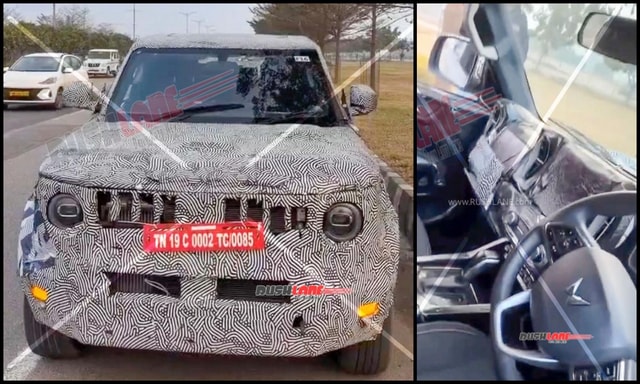 car&bike Team | Jan 29, 2026Mahindra Vision S SUV Interior Spied For The First TimeTest mules of the boxy SUV were initially spotted on public roads in mid 2025, with the concept debuting in August.1 min read
car&bike Team | Jan 29, 2026Mahindra Vision S SUV Interior Spied For The First TimeTest mules of the boxy SUV were initially spotted on public roads in mid 2025, with the concept debuting in August.1 min read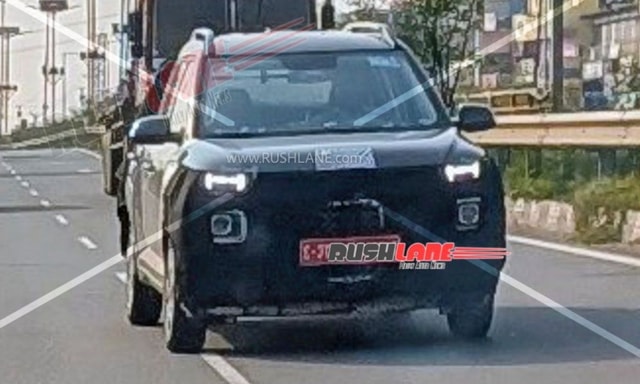 car&bike Team | Jan 29, 2026Hyundai Exter Facelift Spied Testing Ahead Of India DebutUpdated Exter is expected to make its debut later in the year as Hyundai will look to better compete with the Punch.1 min read
car&bike Team | Jan 29, 2026Hyundai Exter Facelift Spied Testing Ahead Of India DebutUpdated Exter is expected to make its debut later in the year as Hyundai will look to better compete with the Punch.1 min read Janak Sorap | Jan 29, 20262023 World Superbike Championship-winning Ducati Panigale V4 R: Photo GalleryThis one is not tribute bike or a factory replica, but the very machine ridden by Álvaro Bautista during his record-breaking WorldSBK title in the 2023 season.1 min read
Janak Sorap | Jan 29, 20262023 World Superbike Championship-winning Ducati Panigale V4 R: Photo GalleryThis one is not tribute bike or a factory replica, but the very machine ridden by Álvaro Bautista during his record-breaking WorldSBK title in the 2023 season.1 min read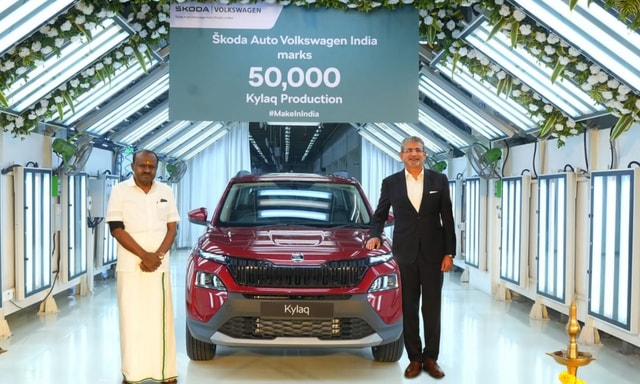 car&bike Team | Jan 29, 2026Skoda Kylaq Crosses 50,000 Units Production MilestoneThe sub-compact SUV has played a major role in Skoda’s 107 per cent sales growth in 2025.2 mins read
car&bike Team | Jan 29, 2026Skoda Kylaq Crosses 50,000 Units Production MilestoneThe sub-compact SUV has played a major role in Skoda’s 107 per cent sales growth in 2025.2 mins read Janak Sorap | Jan 29, 2026KTM 390 Adventure R Launched in India at Rs. 3.78 LakhKTM has quietly expanded its adventure lineup in India with the launch of the more off-road-focused 390 Adventure R.1 min read
Janak Sorap | Jan 29, 2026KTM 390 Adventure R Launched in India at Rs. 3.78 LakhKTM has quietly expanded its adventure lineup in India with the launch of the more off-road-focused 390 Adventure R.1 min read
 Bilal Firfiray | Jan 21, 2026Tata Punch Facelift Review: New Turbo Engine; Same Old SoulWith the update, the Tata Punch facelift retains its character of being a healthy runabout, which is perfect for Indian roads. But have these changes made it any better?7 mins read
Bilal Firfiray | Jan 21, 2026Tata Punch Facelift Review: New Turbo Engine; Same Old SoulWith the update, the Tata Punch facelift retains its character of being a healthy runabout, which is perfect for Indian roads. But have these changes made it any better?7 mins read Amaan Ahmed | Jan 17, 2026Bajaj Chetak C25 First Ride Review: Basic, Likeable E-Scooter For First-Time RidersThe Chetak C25, in quite a few ways, is poles apart from the larger and more powerful 30 and 35 Series models, but in its mannerisms, it is very much a Chetak.8 mins read
Amaan Ahmed | Jan 17, 2026Bajaj Chetak C25 First Ride Review: Basic, Likeable E-Scooter For First-Time RidersThe Chetak C25, in quite a few ways, is poles apart from the larger and more powerful 30 and 35 Series models, but in its mannerisms, it is very much a Chetak.8 mins read Bilal Firfiray | Jan 9, 2026Toyota Urban Cruiser Hyryder: 10,000 km Long-Term ReviewAfter spending over three months and 10,000 km with the Toyota Urban Cruiser Hyryder Hybrid, we were impressed by its real-world mileage, seamless hybrid, practical comfort, and Toyota reliability. Is it the best C-SUV then?5 mins read
Bilal Firfiray | Jan 9, 2026Toyota Urban Cruiser Hyryder: 10,000 km Long-Term ReviewAfter spending over three months and 10,000 km with the Toyota Urban Cruiser Hyryder Hybrid, we were impressed by its real-world mileage, seamless hybrid, practical comfort, and Toyota reliability. Is it the best C-SUV then?5 mins read Seshan Vijayraghvan | Jan 8, 20262026 Mahindra XUV 7XO Review: Big On Tech, Bigger On ComfortThe new Mahindra XUV 7XO is flashier, feature packed, and comes with more advanced tech. But are the changes just incremental or actually substantial?1 min read
Seshan Vijayraghvan | Jan 8, 20262026 Mahindra XUV 7XO Review: Big On Tech, Bigger On ComfortThe new Mahindra XUV 7XO is flashier, feature packed, and comes with more advanced tech. But are the changes just incremental or actually substantial?1 min read Preetam Bora | Jan 10, 2026Simple One Gen 2 First Ride Review: 265 km Claimed Range!The Gen 2 model of Simple Energy’s first electric scooter gets a fair few updates, including new features, tech, more range and lighter weight. We spent a couple of hours with the Simple One Gen 2 to find out if it manages to impress.6 mins read
Preetam Bora | Jan 10, 2026Simple One Gen 2 First Ride Review: 265 km Claimed Range!The Gen 2 model of Simple Energy’s first electric scooter gets a fair few updates, including new features, tech, more range and lighter weight. We spent a couple of hours with the Simple One Gen 2 to find out if it manages to impress.6 mins read




